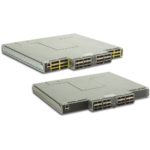In this special guest feature, Wolfgang Gentzsch from The UberCloud writes that we’ve never been so close to ubiquitous computing for researchers and engineers. “High-performance computing continues to progress, but the next big step toward ubiquitous HPC is coming from software container technology based on Docker, facilitating software packaging and porting, ease of access and use, service stack automation and self-service, and simplifying software maintenance and support.”
UberCloud Publishes Compendium of Cloud HPC Case Studies
Our friends at the UberCloud have published the 2018 edition of their Compendium of Cloud HPC Case Studies. “The goal of the UberCloud Experiment is to perform engineering simulation experiments in the HPC cloud with real engineering applications in order to understand the roadblocks to success and how to overcome them. The Compendium is a way of sharing these results with the broader HPC community.”
Shifter – Docker Containers for HPC
Alberto Madonaa gave this talk at the Swiss HPC Conference. “In this work we present an extension to the container runtime of Shifter that provides containerized applications with a mechanism to access GPU accelerators and specialized networking from the host system, effectively enabling performance portability of containers across HPC resources. The presented extension makes possible to rapidly deploy high-performance software on supercomputers from containerized applications that have been developed, built, and tested in non-HPC commodity hardware, e.g. the laptop or workstation of a researcher.”
Video: State of Containers and the Convergence of HPC and BigData
Christian Kniep from Docker Inc gave this talk at the 2018 Swiss HPC Conference. “This talk will recap the history of and what constitutes Linux Containers, before laying out how the technology is employed by various engines and what problems these engines have to solve. Afterward Christian will elaborate on why the advent of standards for images and runtimes moved the discussion from building and distributing containers to orchestrating containerized applications at scale. In conclusion attendees will get an update on how containers foster the convergence of Big Data and HPC workloads and the state of native HPC containers.”
Preliminary Agenda Posted for HPC Advisory Council Swiss Conference
The HPC Advisory Council has posted their meeting agenda for their Swiss Conference. Held in conjunction with HPCXXL, the event takes place April 9-12 in Lugano, Switzerland. “Delve into a wide range of interests, disciplines and topics in HPC – from present day application to its future potential. Join the Centro Svizzero di Calcolo Scientifico (CSCS), HPC Advisory Council members and colleagues from around the world for invited and contributed talks and immersive tutorials at the ninth annual Swiss Conference! Knowledgeable evaluations, prescriptive best practices and provocative insights, the open forum conference brings together industry experts for three days of highly interactive sessions.”
Building Containers for Intel Omni-Path Fabrics using Docker and Singularity
The Intel® OPA technology is designed to leverage the existing Linux* RDMA kernel and networking stack interfaces. As such, many HPC applications designed to run on RDMA networks can run unmodified on compute nodes with Intel® OPA network technology installed, benefitting from improved network performance. When these HPC applications are run in containers, using techniques described in this application note, these same Linux* RDMA kernel device and networking stack interfaces can be selectively exposed to the containerized applications, enabling them to take advantage of the improved network performance of the Intel® OPA technology.
State of Linux Containers
Christian Kniep from Docker Inc. gave this talk at the Stanford HPC Conference. “This talk will recap the history of and what constitutes Linux Containers, before laying out how the technology is employed by various engines and what problems these engines have to solve. Afterward, Christian will elaborate on why the advent of standards for images and runtimes moved the discussion from building and distributing containers to orchestrating containerized applications at scale.”
Stanford HPC Conference Posts Preliminary Agenda
The Stanford HPC Conference has posted it Preliminary Agenda. The two-day event takes place Feb. 20-21 at Stanford University in California. “Join the Stanford High Performance Computing Center, HPC Advisory Council, its members and experts from all over the world for two days of invited and contributed talks and immersive tutorials on topics of great societal impact and responsibility! February’s open forum brings industry luminaries and leading subject matter experts together to examine emerging and major domains and share in-depth insights on AI, Data Sciences, HPC, Machine Learning and more.”
Video: The State of Linux Containers
“Linux Containers gain more and more momentum in all IT ecosystems. This talk provides an overview about what happened in the container landscape (in particular Docker) during the course of the last year and how it impacts datacenter operations, HPC and High-Performance Big Data. Furthermore Christian will give an update/extend on the ‘things to explore’ list he presented in the last Lugano workshop, applying what he learned and came across during the year 2016.”
Kubernetes Meets HPC
“While the notion of packaging a workload into a Docker container, publishing it to a registry, and submitting a YAML description of the workload is second nature to users of Kubernetes, this is foreign to most HPC users. An analyst running models in R, MATLAB or Stata simply wants to submit their simulation quickly, monitor their execution, and get a result as quickly as possible.”











